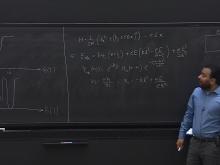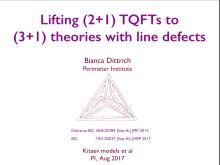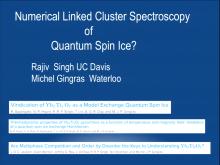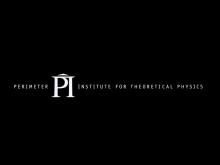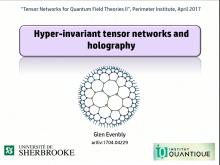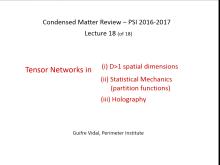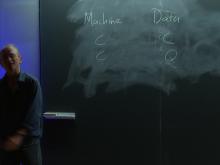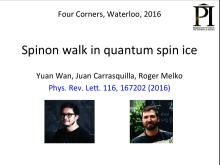Condensed matter physics is the branch of physics that studies systems of very large numbers of particles in a condensed state, like solids or liquids. Condensed matter physics wants to answer questions like: why is a material magnetic? Or why is it insulating or conducting? Or new, exciting questions like: what materials are good to make a reliable quantum computer? Can we describe gravity as the behavior of a material? The behavior of a system with many particles is very different from that of its individual particles. We say that the laws of many body physics are emergent or collective. Emergence explains the beauty of physics laws.
Format results
-
15 talks-Collection NumberC17041
Talk
-

PSI 2017/2018 - Condensed Matter - Lecture 1
Rakesh Tiwari McGill University - Department of Physics
-

PSI 2017/2018 - Condensed Matter - Lecture 2
Rakesh Tiwari McGill University - Department of Physics
-

PSI 2017/2018 - Condensed Matter - Lecture 3
Rakesh Tiwari McGill University - Department of Physics
-

PSI 2017/2018 - Condensed Matter - Lecture 4
Rakesh Tiwari McGill University - Department of Physics
-

PSI 2017/2018 - Condensed Matter - Lecture 5
Rakesh Tiwari McGill University - Department of Physics
-

PSI 2017/2018 - Condensed Matter - Lecture 6
Rakesh Tiwari McGill University - Department of Physics
-

PSI 2017/2018 - Condensed Matter - Lecture 7
Rakesh Tiwari McGill University - Department of Physics
-

PSI 2017/2018 - Condensed Matter - Lecture 8
Rakesh Tiwari McGill University - Department of Physics
-
-
Talk
-

Semisimple Hopf algebras and fusion categories
Cesar Galindo Universidad de los Andes
-

The Hopf C*-algebraic quantum double models - symmetries beyond group theory
Andreas Bauer Freie Universität Berlin
-

Modular categories and the Witt group
Michael Mueger Radboud Universiteit Nijmegen
-

Topological Quantum Computation
Eric Rowell Texas A&M University
-

Gapped phases of matter vs. Topological field theories
Davide Gaiotto Perimeter Institute for Theoretical Physics
-

An Introduction to Hopf Algebra Gauge Theory
Derek Wise University of Erlangen-Nuremberg
-

Kitaev lattice models as a Hopf algebra gauge theory
Catherine Meusburger University of Erlangen-Nuremberg
-

Topological defects and higher-categorical structures
Jurgen Fuchs Karlstad University
-
-
International Workshop on Quantum Spin Ice
20 talks-Collection NumberC17022Talk
-

Microscopic aspects of insulating rare-earth pyrochlore magnets
Jeffrey Rau University of Toronto
-

Lightning review on emergent quantum electrodynamics in quantum spin ice
Yong-Baek Kim University of Toronto
-

The importance of defects and structural flexibility in the physics of quantum spin ices
Tyrel McQueen Johns Hopkins University
-

Quasiparticle breakdown in the quantum pyrochlore Yb2Ti2O7 in magnetic field
Radu Coldea University of Oxford
-

Lobed phase diagram of single crystalline Yb2Ti2O7 in [111] magnetic field
Collin Broholm National Institute of Standards and Technology
-

Experimental signatures of phase competition in quantum XY pyrochlores
Alannah Hallas McMaster University
-

-

-
-
4 Corners Southwest Ontario Condensed Matter Symposium 2017
11 talks-Collection NumberC17016Talk
-

-

Delafossite layered metals: intriguing physics in the high purity limit
Andrew Mackenzie Max Planck Institute
-

NMR signature of charge order in high Tc cuprates revisited
Takashi Imai McMaster University
-

Entanglement area law in superfluid 4He
Chris Herdman Institute for Quantum Computing (IQC)
-

-

Topological states in honeycomb materials
Hae-Young Kee University of Toronto
-

Many-body physics in a trapped ion quantum simulator
Kazi-Rajibul Islam Institute for Quantum Computing (IQC)
-

Understanding the Emergence of Chiral Spin Liquids in Mott Insulators
Ciaran Hickey University of Toronto
-
-
Tensor Networks for Quantum Field Theories II
18 talks-Collection NumberC17011Talk
-

Discretizing the many-electron Schrodinger Equation
Steven White University of California, Irvine
-

Emergence of conformal symmetry in critical spin chains
Ashley Milsted California Institute of Technology
-

-

-

Bridging Perturbative Expansions with Tensor Networks
Jutho Haegeman Ghent University
-

The continuous multi-scale entanglement renormalization ansatz (cMERA)
Guifre Vidal Alphabet (United States)
-

Unitary Networks from the Exact Renormalization of Wavefunctionals
Rob Leigh University of Illinois Urbana-Champaign
-

Tensor networks and Legendre transforms
Brian Swingle Brandeis University
-
-
PSI 2016/2017 - Condensed Matter Review (Vidal)
12 talks-Collection NumberC17002Talk
-

PSI 2016/2017 - Condensed Matter (Review) - Lecture 1
Guifre Vidal Alphabet (United States)
-

PSI 2016/2017 - Condensed Matter (Review) - Lecture 2
Guifre Vidal Alphabet (United States)
-

PSI 2016/2017 - Condensed Matter (Review) - Lecture 3
Guifre Vidal Alphabet (United States)
-

PSI 2016/2017 - Condensed Matter (Review) - Lecture 4
Guifre Vidal Alphabet (United States)
-

PSI 2016/2017 - Condensed Matter (Review) - Lecture 5
Guifre Vidal Alphabet (United States)
-

PSI 2016/2017 - Condensed Matter (Review) - Lecture 6
Guifre Vidal Alphabet (United States)
-

PSI 2016/2017 - Condensed Matter (Review) - Lecture 7
Guifre Vidal Alphabet (United States)
-

PSI 2016/2017 - Condensed Matter (Review) - Lecture 8
Guifre Vidal Alphabet (United States)
-
-
Low Energy Challenges for High Energy Physicists II
21 talks-Collection NumberC16019Talk
-

-

Solitons and Spin-Charge Correlations in Strongly Interacting Fermi Gases
Martin Zwierlein Massachusetts Institute of Technology (MIT)
-

Hierarchical growth of entangled states
John McGreevy University of California, San Diego
-

Scaling geometries and DC conductivities
Sera Cremonini Lehigh University
-

Viscous Electron Fluids: Higher-Than-Ballistic Conduction Negative Nonlocal Resistance and Vortices
Leonid Levitov Massachusetts Institute of Technology (MIT) - Department of Physics
-

Universal Diffusion and the Butterfly Effect
Michael Blake Massachusetts Institute of Technology (MIT)
-

Particle-Vortex duality and Topological Quantum Matter
Jeff Murugan Institute for Advanced Study (IAS) - School of Natural Sciences (SNS)
-

TBA
Andrew Mackenzie Max Planck Institute
-
-
Quantum Machine Learning
21 talks-Collection NumberC16017Talk
-

-

Comparing Classical and Quantum Methods for Supervised Machine Learning
Ashish Kapoor Microsoft Corporation
-

Classification on a quantum computer: Linear regression and ensemble methods
Maria Schuld University of KwaZulu-Natal
-

Rejection and Particle Filtering for Hamiltonian Learning
Cassandra Granade Dual Space Solutions, LLC
-

-

-

Physical approaches to the extraction of relevant information
David Schwab Northwestern University
-

Learning with Quantum-Inspired Tensor Networks
Miles Stoudenmire Flatiron Institute
-
-
4 Corners Southwest Ontario Condensed Matter Symposium
9 talks-Collection NumberC16007Talk
-

-

Superconductivity and Charge Density Waves in the Clean 2D Limit
Adam Tsen Institute for Quantum Computing (IQC)
-

Honeycomb lattice quantum magnets with strong spin-orbit coupling
Young-June Kim University of Toronto
-

-

-

Stochastic Resonance Magnetic Force Microscopy: A Technique for Nanoscale Imaging of Vortex Dynamics
Raffi Budakian Institute for Quantum Computing (IQC)
-

Spin Slush in an Extended Spin Ice Model
Jeff Rau University of Waterloo
-

Universal Dynamic Magnetism in the Ytterbium Pyrochlores
Alannah Hallas McMaster University
-
-

Extra Lecture - Quantum Matter, PHYS 777 2/2
Chong Wang Perimeter Institute for Theoretical Physics
-

-

Extra Lecture - Quantum Matter, PHYS 777 1/2
Chong Wang Perimeter Institute for Theoretical Physics
-
PSI 2017/2018 - Condensed Matter (Tiwari)
15 talks-Collection NumberC17041PSI 2017/2018 - Condensed Matter (Tiwari) -
Hopf Algebras in Kitaev's Quantum Double Models: Mathematical Connections from Gauge Theory to Topological Quantum Computing and Categorical Quantum Mechanics
18 talks-Collection NumberC17029The Kitaev quantum double models are a family of topologically ordered spin models originally proposed to exploit the novel condensed matter phenomenology of topological phases for fault-tolerant quantum computation. Their physics is inherited from topological quantum field theories, while their underlying mathematical structure is based on a class of Hopf algebras. This structure is also seen across diverse fields of physics, and so allows connections to be made between the Kitaev models and topics as varied as quantum gauge theory and modified strong complementarity. This workshop will explore this shared mathematical structure and in so doing develop the connections between the fields of mathematical physics, quantum gravity, quantum information, condensed matter and quantum foundations.
-
International Workshop on Quantum Spin Ice
20 talks-Collection NumberC17022International Workshop on Quantum Spin Ice
-
4 Corners Southwest Ontario Condensed Matter Symposium 2017
11 talks-Collection NumberC17016This tenth annual one-day symposium aims to provide an opportunity for condensed matter researchers in Southwest Ontario to gather and discuss informally their most recent research. The general format of the meeting consists of 2 guest speakers and 5-7 contributed talks. The names of the contributing speakers and title of their talks will be announced later. Registration begins at 9:30 am. The meeting is expected to start around 9:45 am and end between 5-5:30 pm. A lunch will be provided by the Black Hole Bistro.
There will be two keynote speaker for the symposium; Professor Andrew Mackenzie from the Max Planck Institute for Chemical Physics of Solids,Dresden and Professor Anders Sandvik from Boston University. Their talk titles will be announced at a later date.
Registration for this event will open shortly.
-
Tensor Networks for Quantum Field Theories II
18 talks-Collection NumberC17011Tensor Networks for Quantum Field Theories II -
PSI 2016/2017 - Condensed Matter Review (Vidal)
12 talks-Collection NumberC17002PSI 2016/2017 - Condensed Matter Review (Vidal) -
Low Energy Challenges for High Energy Physicists II
21 talks-Collection NumberC16019Low Energy Challenges for High Energy Physicists II
-
-
4 Corners Southwest Ontario Condensed Matter Symposium
9 talks-Collection NumberC160074 Corners Southwest Ontario Condensed Matter Symposium -

Extra Lecture - Quantum Matter, PHYS 777 2/2
Chong Wang Perimeter Institute for Theoretical Physics
Optional
-

Superconductivity, with Anyons
Hart Goldman University of Minnesota
I will discuss the phenomenology of superconductors hosting both order parameter vortices and fractionally charged anyon excitations. I will demonstrate that in such systems superconductivity and topological order are intertwined under applied magnetic fields, leading to surprising observable consequences departing from traditional superconductivity from electronic pairing. In particular, I will show that vortices nucleated by perpendicular magnetic fields must trap anyons in their cores. However, because only some vortices can trap an integer number of anyons, this places a constraint on the vortex phase winding. In general, rather than the expected hc/2e quantization of superconducting vortices, we find instead the enhanced flux quantum of hc/e, which I will argue should affect a wide range of observables. I will further develop a general Landau-Ginzburg theory describing vortex fluctuations and discuss the phase diagram as perpendicular magnetic field is increased, showing that condensation of the intertwined vortices leads to exotic insulating phases hosting neutral anyons and a nonvanishing thermal Hall effect.
-

Extra Lecture - Quantum Matter, PHYS 777 1/2
Chong Wang Perimeter Institute for Theoretical Physics
Optional
